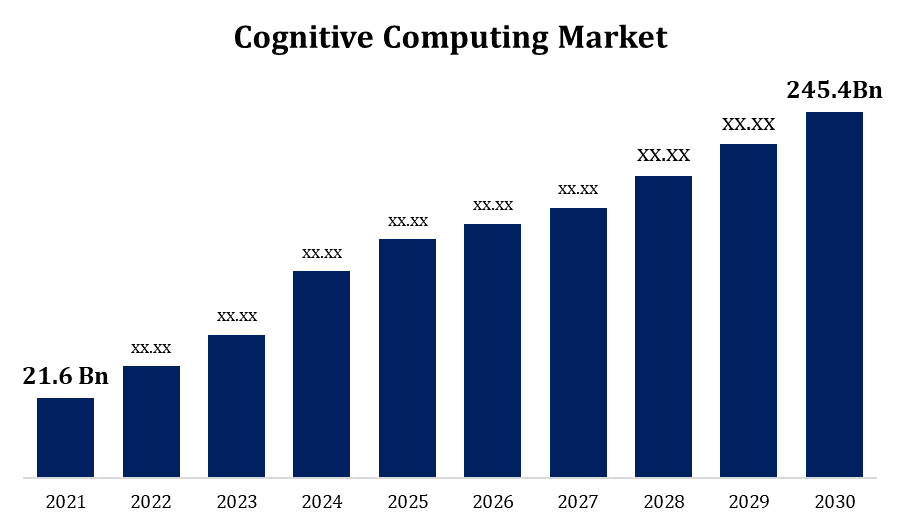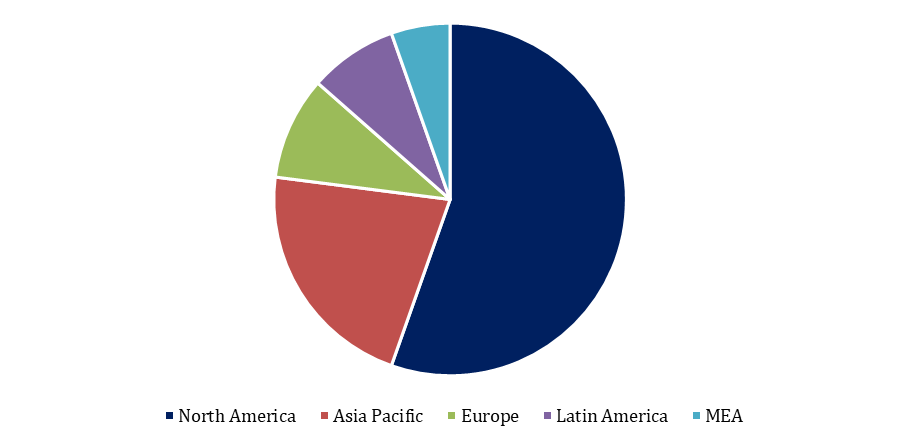Global Cognitive Computing Market Size, Share, and COVID-19 Impact Analysis, By Technology (Machine Learning, Automated Reasoning, Natural Language Processing, and Others), By Deployment Type (On-Premise and Cloud), and By Industry Vertical (Healthcare, BFSI, Retail, Government & Defense, IT & Telecom, Energy & Power, and Others), and by Region (North America, Europe, Asia-Pacific, Latin America, Middle East and Africa), Analysis and Forecast 2021 – 2030
Industry: Information & TechnologyGlobal Cognitive Computing Market Insights Forecasts to 2030
- The global cognitive computing market was valued at USD 21.6 billion in 2021.
- The market is growing at a CAGR of 31% from 2021 to 2030
- The global cognitive computing market is expected to reach USD 245.4 billion by 2030
- The Asia Pacific is expected to grow the fastest during the forecast period
The Global Cognitive Computing Market is expected to reach USD 245.4 billion by 2030, at a CAGR of 31% during the forecast period 2021 to 2030. The cognitive computing market has grown due to the increasing demand for cloud-based services. However, the lack of awareness related to cognitive computing is expected to hamper the market’s growth over the forecast period.

Get more details on this report -
Market Overview
Cognitive computing is a technology that is based on the principles of Artificial intelligence, signal processing, machine learning, and natural language processing. It helps add intelligence similar to that of a human being to a variety of business applications that uses big data. A well-known cognitive computing technique is primarily designed for processing and analyzing huge, unstructured collections. Cognitive computing is considered the next-generation technology that helps understand the complexity of unstructured data with the help of human data and helps experts make better decisions. Technologies including natural language processing, automated reasoning, machine learning, and information retrieval are used to translate unstructured data into a sense, infer, and predict the optimum solution. Owing to cloud-based services, there is a growth in the demand for cognitive systems in large organizations, which is anticipated to grow in small and medium-sized firms. The overall demand for cloud-based services increases as cloud-based deployment lowers the cost of implementing cognitive computing within the enterprise. In the upcoming years, IBM Watson, a major player in the market for cognitive computing, plans to launch Watson Analytics. This cloud-based service will accelerate the adoption of cognitive computing through the cloud. In developed countries, the demand for cognitive computing is increasing rapidly and is expected to proliferate over the forecast period. However, the lack of awareness related to cognitive computing is expected to hamper the market’s growth over the forecast period.
Global Cognitive Computing Market Report Coverage
| Report Coverage | Details |
|---|---|
| Base Year: | 2021 |
| Market Size in 2021: | USD 21.6 Billion |
| Forecast Period: | 2021-2030 |
| Forecast Period CAGR 2021-2030 : | 31% |
| 2030 Value Projection: | USD 245.4 Billion |
| Historical Data for: | 2017-2020 |
| No. of Pages: | 196 |
| Tables, Charts & Figures: | 140 |
| Segments covered: | By Technology, By Deployment Type , By Industry Vertical, By Region |
| Companies covered:: | PTC, Google, Numenta, HP Development Company, L.P., IBM, Microsoft Corporation, Nuance Communications Inc., Saffron Technology, SAP, Oracle Corporation, Statistical Analysis System (SAS), Palantir, Tibco Software, Vicarious L.P, Enterra Solutions, CognitiveScale |
Get more details on this report -
Report Coverage
This research report on the global cognitive computing market categorizes the market for cognitive computing based on various segments and regions, forecasts revenue growth, and analyzes trends in each submarket. The report analyses the key growth drivers, opportunities, and challenges influencing the cognitive computing market. Recent market developments and competitive strategies such as expansion, product launch and development, partnership, merger, and acquisition have been included to draw the competitive landscape in the market. The report strategically identifies and profiles the key market players and analyses their core competencies in each sub-segments of the cognitive computing market.
Segmentation Analysis
- In 2021, the natural language processing segment dominated the market with the largest market share of 41% and market revenue of 8.85 billion.
Based on technology, the cognitive computing market is categorized into machine learning, automated reasoning, natural language processing, and others. In 2021, the natural language processing (PVC) segment dominated the market with the largest market share of 41% and market revenue of 8.85 billion. The natural language processing segment will account for the greatest revenue in the market owing to its inherent capacity to process interactions in natural language. The emergence of natural language processing has helped cognitive technology propel global IT infrastructure. Moreover, the increasing demand for smart assistants, such as Alexa and Siri, and predictive text has augmented the footprint of cognitive computing solutions in several applications. Moreover, the industry players expect natural language processing to provide better interpretation and translation tools.
- In 2021, the Cloud-based deployment segment accounted for the largest share of the market, with 63% and a market revenue of 13.60 billion.
Based on deployment type, the cognitive computing market is categorized into on-premise and cloud. In 2021, the Cloud-based deployment segment dominated the market with the largest market share of 63% and market revenue of 13.60 billion. Cloud based deployment segment has accounted for the largest revenue in the market owing to several facilities provided by the cloud-based deployment system, such as integrated cloud storage facilities, and the evolvement of cloud solutions based on customization, such as public and private clouds. Additionally, businesses and organizations are turning to cloud solutions owing to the prevalence of large amounts of data. The increasing adoption of the wide range of cloud computing services is expected to provide opportunities to stakeholders to lower the price of cognitive computing.
- In 2021, the BFSI segment accounted for the largest share of the market, with 17% and market revenue of 3.6 billion.
Based on industry vertical, the cognitive computing market is categorized into BFSI, healthcare, retail, IT & Telecom, energy & power, government & defense, and others. In 2021, the BFSI segment dominated the market with the largest market share of 17% and market revenue of 3.6 billion. The BFSI segment has accounted for the largest revenue in the market as it regularly deals with a lot of data. The adoption of cognitive solutions in the BFSI industry includes powerful data analytics capabilities tailored to the corporate organization's needs. Furthermore, cognitive computing helps in data collection and storage, boosting the segment’s growth during the forecast period.
Regional Segment Analysis of the Cognitive Computing Market
- North America (U.S., Canada, Mexico)
- Europe (Germany, France, U.K., Italy, Spain, Rest of Europe)
- Asia-Pacific (China, Japan, India, Rest of APAC)
- South America (Brazil and the Rest of South America)
- The Middle East and Africa (UAE, South Africa, Rest of MEA)

Get more details on this report -
North America emerged as the largest market for the global Cognitive Computing market, with a market share of around 38.6% and 7.94 billion of the market revenue in 2021.
- In 2021, North America emerged as the largest market for the global cognitive computing market, with a market share of around 38.6% and 7.94 billion of the market revenue. North America is expected to be the largest market. This growth of the cognitive computing market is attributed to the emergence of new business models and the increasing adoption of integrated cloud platforms. The importance of data security is anticipated to be promoted by strong government policies in the United States and Canada, accelerating the implementation of these systems across the region. Furthermore, the increasing use of startups and internet-adopting cognitive computing solutions is expected to propel the market’s growth in the region. Organizations have begun adopting cognitive computing technologies, particularly in the US, to evaluate massive amounts of data and offer better solutions. The development of cognitive solutions in this field has also benefited from recent technical developments like 5G and IoT.
- The Asia Pacific market is expected to grow at the fastest CAGR between 2021 and 2030. This market growth in the region can be attributed to helpful government programs promoting the use of cognitive computing. Furthermore, the increasing penetration of the internet and startup culture in the Asia Pacific, such as China, India, Japan, and Australia, propels the market’s growth. In addition, developing the latest technologies, such as 5g and IoT, in the region adds impetus to the market’s growth over the forecast period.
Competitive Landscape
The report offers the appropriate analysis of the key organizations/companies involved within the global cognitive computing market along with a comparative evaluation primarily based on their product offering, business overviews, geographic presence, enterprise strategies, segment market share, and SWOT analysis. The report also provides an elaborative analysis focusing on the companies' current news and developments, including product development, innovations, joint ventures, partnerships, mergers & acquisitions, strategic alliances, and others. This allows for the evaluation of the overall competition within the market.
List of Key Market Players:
- PTC
- Numenta
- HP Development Company, L.P.
- IBM, Microsoft Corporation
- Nuance Communications Inc.
- Saffron Technology
- SAP
- Oracle Corporation
- Statistical Analysis System (SAS)
- Palantir
- Tibco Software
- Vicarious, L.P
- Enterra Solutions
- CognitiveScale
Key Target Audience
- Market Players
- Investors
- End-users
- Government Authorities
- Consulting And Research Firm
- Venture capitalists
- Third-party knowledge providers
- Value-Added Resellers (VARs)
Some of the Key Developments:
- In May 2020, The launch of a new AI healthcare plan was announced by the online education platform Udacity. According to the digital educator, the new AI course instructs students on applying AI in medical image processing, electronic health records, and other fields.
- In May 2019, Microsoft Corporation formally released numerous new cognitive services and sophisticated Azure features. These services include artificial intelligence, mixed reality, IoT, and blockchain, providing more advancement in hybrid cloud and computing.
- In April 2018, IBM and Media Math collaborated. The partnership combines Watson's cognitive capabilities with Media Math's maximum capability, allowing businesses to produce millions of tailored advertisements that reach a consumer on the ideal device at the ideal time to persuade.
Market Segment
This study forecasts global, regional, and country revenue from 2021 to 2030. Spherical Insights has segmented the global cognitive computing market based on the below-mentioned segments:
Cognitive Computing Market, By Technology
- Machine Learning
- Automated Reasoning
- Natural Language Processing
- Others
Cognitive Computing Market, By Deployment Type
- On-Premise
- Cloud
Cognitive Computing Market, By Industry Vertical
- Healthcare
- BFSI
- Retail
- Government & Defense
- IT & Telecom
- Energy & Power
- Others
Cognitive Computing Market, Regional Analysis
- North America
- US
- Canada
- Mexico
- Europe
- Germany
- Uk
- France
- Italy
- Spain
- Russia
- Rest of Europe
- Asia Pacific
- China
- Japan
- India
- South Korea
- Australia
- Rest of Asia Pacific
- South America
- Brazil
- Argentina
- Rest of South America
- Middle East & Africa
- UAE
- Saudi Arabia
- Qatar
- South Africa
- Rest of Middle East & Africa
Need help to buy this report?